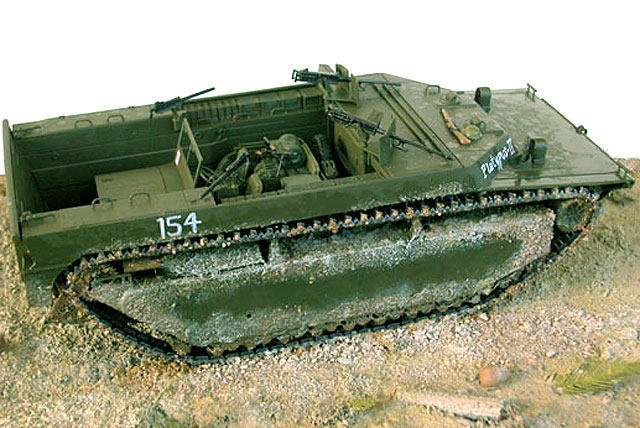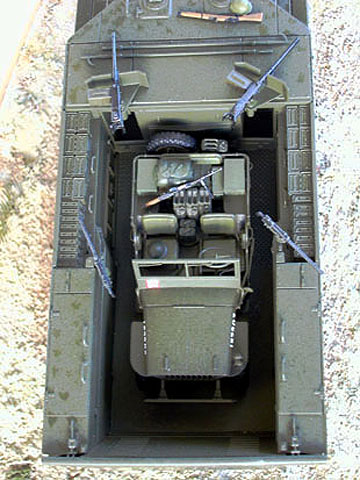|
LVT-4 Amtrack
by
Mick Toal
|
 |
|
LVT-4 |

Italeri's
1/35 scale LVT-4 Water Buffalo is available online from Squadron.com
Every now and then us underachieving modellers who
strive for perfection, but in reality never complete any project, need a
"no brainer" to refresh and revitalise their creativity.
A mate of mine, Colonel Cris Anstey, was the
commandant of the (Australian) Army Logistic Training Centre at Bandiana
and I completed this project as a farewell presentation.
The ALTC is responsible for general and water
transport, ordnance, medical and supply training, among a multitude of
other roles.I wanted to build an historic vehicle which reflected these
roles and when the Italeri 1/35th LVT-4 came along I immediately thought
of the famous series of photographs of the US-crewed amtracs supporting
Australian forces at Balikpapan, Borneo, in June 1945.
After trawling through the Australian War Memorial
photo database, I chanced upon a picture of an LVT-4 with the distinctly
Aussie nickname "Platypus II''.
Although a welcome release, the Italeri LVT is not
without its problems. The vehicle is a post-war variant which seems to
have some features peculiar to a vehicle in service with the Italian
Army in the 1960s.
 In
order to depict a World War II vehicle at Balikpapan I cut out the
co-driver's hatch, filled in the hole, and repositioned it level with
the driver's hatch. I also filled in the locating points for the vision
blocks, fitted the simple armoured flap for the driver, scratch built
periscopes for both hatches and fitted other small detail. In
order to depict a World War II vehicle at Balikpapan I cut out the
co-driver's hatch, filled in the hole, and repositioned it level with
the driver's hatch. I also filled in the locating points for the vision
blocks, fitted the simple armoured flap for the driver, scratch built
periscopes for both hatches and fitted other small detail.
If I decided to be really clever, I could have
opened the hatches, necessitating some interior detail, and revamped the
cargo area floor to make a truly accurate World War II LVT, but, hey,
this was a no-brainer
project.
That said, the propulsion vanes at the rear were
unacceptably heavy-handed and I scratch-built new items, which wasn't
such a daunting project, from thin plasticard.
On the basis US forces gave the shore a pounding
with everything they had as the first waves were going ashore in any
island hop, a selection of .30 and .50 cal ammo boxes were placed in the
interior sponsons. Markings were hand painted free hand, just like the
originals. The Jeep is the newer Tamiya offering loaded with various
Verlinden and Italeri bits.
I don't know if Cris will notice, but the marking
on the Willys match those on a Jeep on display in the excellent Bandiana
Army Museum, which sports original markings from a vehicle serving with
an Australian infantry battalion as part of the British Commonwealth
Occupation Forces in Japan post war.
Once again, am unsure if that vehicle was at
Balikpapan, but this is a no-brainer.
Being in the throes of moving house, I painted the
two built kits with a Humbrol spray can of olive drab after giving the
LVT a thorough coating of sand and beach debris mixed with watered-down
white glue.
The diorama base was Spakfilla with various tree trunks and leaves
embedded in it and a liberal coat of river sand.
Once the LVT was set onto the base, I spinkled sand
onto thinned white glue to blend it with the terrain. I then gave the
lot a coat of matt lacquer before various washings and dry brushings.
I then roughly painted gloss laquer up to the water
line and gave the whole creation, including its cargo, a spattering of
gloss laquer with a tooth brush.
The result is meant to depict a newly beached LVT
covered in sea spray during its trip from ship to shore.
The flex-mounted .50 and .30 cal Brownings are straight from the kit.
Once again, more detail such as ammo belts could have been added, but
this was a minimalist project.
I have no idea how accurate the final offering is,
but it looks like a US-crewed LVT-4 supporting the Australia forces at
Balikpapan and my mate Cris was delighted with the presentation.
Personally, I had great fun... it took me back to
the days when I just built a model for the hell of it without the
constraints of competition judges and fastidious research.
And, unlike my more high-brow competition
contenders and would-be museum displays, this project was actually
finished!
Model, Images and Text Copyright ©
2003 by Mick Toal
Page Created 25 April, 2003
Last Updated
25 March, 2004
Back to
HyperScale Main Page |
Home |
What's New |
Features |
Gallery |
Reviews |
Reference |
Forum |
Search